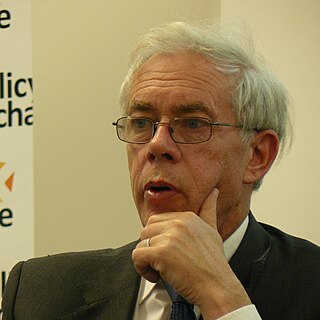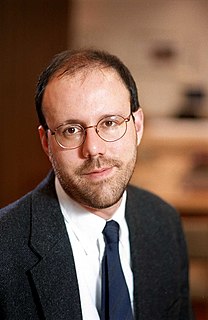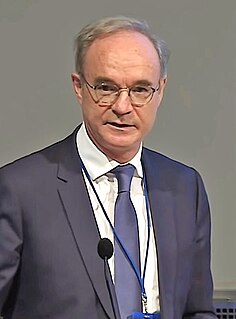Related Research Articles

Kamer Daron Acemoğlu is a Turkish-born American economist who has taught at the Massachusetts Institute of Technology (MIT) since 1993. He is currently the Elizabeth and James Killian Professor of Economics at MIT. He was named Institute Professor in 2019.
Donald Angus MacKenzie is a Professor of Sociology at the University of Edinburgh, Scotland. His work constitutes a crucial contribution to the field of science and technology studies. He has also developed research in the field of social studies of finance. He has undertaken widely cited work on the history of statistics, eugenics, nuclear weapons, computing and finance, among other things.

John Quiggin is an Australian economist, a professor at the University of Queensland. He was formerly an Australian Research Council Laureate Fellow and Federation Fellow and a member of the board of the Climate Change Authority of the Australian Government.

Oliver Simon D'Arcy Hart is a British-born American economist, currently the Lewis P. and Linda L. Geyser University Professor at Harvard University. Together with Bengt R. Holmström, he received the Nobel Memorial Prize in Economic Sciences in 2016.

Jean Tirole is a French professor of economics at Toulouse 1 Capitole University. He focuses on industrial organization, game theory, banking and finance, and economics and psychology. In 2014 he was awarded the Nobel Memorial Prize in Economic Sciences for his analysis of market power and regulation.

Sir Stephen John Nickell, is a British economist and former warden of Nuffield College, Oxford, noted for his work in labour economics with Richard Layard and Richard Jackman. Nickell and Layard hypothesised the tendency for reduced unemployment to lead to inflation resulted from its effect on competitive bargaining in the labour market He is currently a member of the Office for Budget Responsibility's Budget Responsibility Committee.

Charles Albert Eric Goodhart, is a British economist. His career can be divided into two sections: his term with the Bank of England and its associated public policy; and his academic work with the London School of Economics. Charles Goodhart's work focuses on central bank governance practices and monetary frameworks. He also conducted academic research into foreign exchange markets. He is best known as the founder of Goodhart's Law, which states: "When a measure becomes a target, it ceases to be a good measure."

Sir John Anderson Kay, is a British economist. He was the first dean of Oxford’s Said Business School and has held chairs at the London School of Economics, the University of Oxford, and London Business School. He has been a fellow of St John's College, Oxford, since 1970.

Michael Robert Kremer is an American development economist who is University Professor in Economics And Public Policy at the University of Chicago. He is the founding director of the Development Innovation Lab at the Becker Friedman Institute for Economics. Kremer served as the Gates Professor of Developing Societies at Harvard University until 2020. In 2019, he was jointly awarded the Nobel Memorial Prize in Economics, together with Esther Duflo and Abhijit Banerjee, "for their experimental approach to alleviating global poverty."

Sir Richard William Blundell CBE FBA is a British economist and econometrician.

Robert James Shiller is an American economist, academic, and best-selling author. As of 2019, he serves as a Sterling Professor of Economics at Yale University and is a fellow at the Yale School of Management's International Center for Finance. Shiller has been a research associate of the National Bureau of Economic Research (NBER) since 1980, was vice president of the American Economic Association in 2005, its president-elect for 2016, and president of the Eastern Economic Association for 2006–2007. He is also the co‑founder and chief economist of the investment management firm MacroMarkets LLC.
John Young Campbell is a British-American economist. He is the Morton L. and Carole S. Olshan Professor of Economics at the Department of Economics at Harvard University since 1994.
Simon Deakin is Professor of Law at the Faculty of Law, Cambridge, and a Fellow of Peterhouse, Cambridge. He is regarded as the leading expert in the field of employment law and labour law and is the programme director in the Cambridge Centre for Business Research (CBR), as well as an associate Faculty member of the Judge Business School.
Philippe Mario Aghion FBA is a French economist who is a Professor at College de France, at INSEAD, and at the London School of Economics. He is also teaching at the Paris School of Economics. Philippe Aghion was formerly the Robert C. Waggoner Professor of Economics at Harvard University. Prior to that, he was a Professor at University College London, an Official Fellow at Nuffield College, Oxford, and an Assistant Professor at the Massachusetts Institute of Technology (MIT).
David Michael Garrood Newbery, CBE, FBA, is a Professor of Applied Economics at the University of Cambridge. He got this position in 1988. He specializes in the field of energy economics, and he writes on the regulation of electricity markets. His interests also include climate change mitigation and environmental policy, privatisation, and risk.

Markus Konrad Brunnermeier is an economist, who is the Edwards S. Sanford Professor of Economics at Princeton University, and a nonresident senior fellow at the Peterson Institute for International Economics. He is a faculty member of Princeton's Department of Economics and director of the Bendheim Center for Finance. His research focuses on international financial markets and the macro economy with special emphasis on bubbles, liquidity, financial crises and monetary policy. He promoted the concepts of liquidity spirals, CoVaR as co-risk measure, the paradox of prudence, financial dominance, ESBies, the Reversal Rate, Digital currency areas, the redistributive monetary policy, and the I Theory of Money. He is or was a member of several advisory groups, including to the IMF, the Federal Reserve Bank of New York, the European Systemic Risk Board, the German Bundesbank and the U.S. Congressional Budget Office. He is also a research associate at CEPR, NBER, and CESifo.
Franklin Allen, is a British economist and academic. Since 2014, he has been professor of finance and economics, and executive director of the Brevan Howard Centre at Imperial College London. He was the Nippon Life Professor of Finance and Economics at the Wharton School of the University of Pennsylvania. He is most active in the research areas of financial innovations, asset price bubbles, the comparison of financial systems, and financial crises.
Douglas Gale is an economics professor at New York University. At NYU, Gale is a Julius Silver professor. He was elected a fellow of the British Academy in 2016. Gale is a specialist in general equilibrium theory, financial economics and banking, experimental economics and decision theory.

Patrick Bolton is the Barbara and David Zalaznick Professor of Business at Columbia Business School (2005-present) and a Visiting Professor of Finance at Imperial College London (2018-present). He is a past president of the American Finance Association (2015).
The 2021 Nobel Memorial Prize in Economic Sciences was divided one half awarded to the American-Canadian David Card "for his empirical contributions to labour economics", the other half jointly to Israeli-American Joshua Angrist and Dutch-American Guido W. Imbens "for their methodological contributions to the analysis of causal relationships." The Nobel Committee stated their reason behind the decision, saying:
"This year's Laureates – David Card, Joshua Angrist and Guido Imbens – have shown that natural experiments can be used to answer central questions for society, such as how minimum wages and immigration affect the labour market. They have also clarified exactly which conclusions about cause and effect can be drawn using this research approach. Together, they have revolutionised empirical research in the economic sciences."
References
- 1 2 3 "Dimitri Vayanos Curriculum Vitae", London School of Economics (July 2019). Retrieved 28 August 2019.
- ↑ "Vayanos, Prof. Dimitri", Who's Who (online ed., Oxford University Press, December 2018). Retrieved 28 August 2019.
- 1 2 "Professor Dimitri Vayanos FBA", British Academy. Retrieved 28 August 2019.